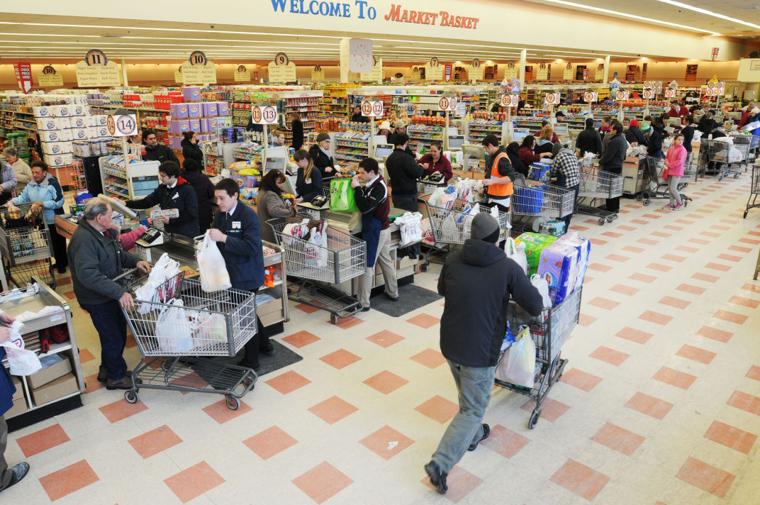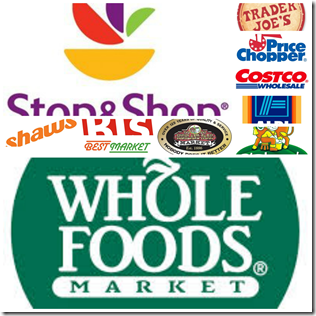This simple bit of grocery store advice will spare you a lifetime of regret. Give you back hours in your week. Bring sanity back to your everyday life.
/I met a woman from Denmark last week. She’s been living in the United States for about a year. I asked her what she liked best about our country.
Her response (paraphrased as best as I remember) was immediate:
You're not going to believe it, but it's Stop & Shop. And all the grocery stores like it. In Denmark, we spend half of our weekend shopping for food. Bread from the baker. Meat from the butcher. Produce from the grocer. It's ridiculous. You Americans put it all under one roof. I can finish my shopping in less than an hour. It's an amazing innovation, but I still watch my American friends drive everywhere for their food. This at Whole Foods. That at Trader Joes. Stew Leonard’s. Stop & Shop. Farmer's Markets. It's ridiculous.
I couldn't believe it. I finally found someone who agreed with me on this grocery store shopping insanity happening all around me.
I watch my friends and family members drive all over town – seemingly everyday – for their groceries.
Meat from Whole Foods
Produce from Stop & Shop
Coffee from the artisanal coffee roaster
Paper goods and cleaning supplies from Costco
Prepared foods from Trader Joes
Pet supplies from Petco
This is not an exaggeration. At a dinner party recently, a friend lamented that more than half of her marriage has been spent with she or her husband shopping for food.
Why?
People tell me that it's outstanding quality and low prices that they seek. This place has the best meat. That place has the best fruit. This place has the best prices on paper towels.
It's insanity. And it’s a mistake. A terrible, nonsensical mistake, for two reasons:
1. If I conducted a double-blind taste test of food quality between these stores, no person could reliably tell the difference. If I prepared a dinner of roasted chicken, asparagus sprouts, wild rice, and an apple pie for dessert using food purchased from Whole Foods, Stop & Shop, and Stew Leonard’s and asked you to tell me which one came from which store, there is no way you or anyone else could consistently tell me the difference.
It feels good to think that you are improving the quality of your family's food, but it's an improvement that exists almost entirely in your mind.
2. More importantly, even if there was a discernible difference in quality or taste between stores, this marginal difference is not worth the time spent shuffling off to each of the stores for what my friend described as half of her married life.
This is what the woman from Denmark understands but Americans have forgotten:
Time is our most precious commodity. It should be guarded at all costs. Valued above all else. Spent with enormous care.
There was a time when America was dotted with bakers and butchers and fishmongers and green grocers. Like Denmark, there was a time when the bulk of Saturday was spent going from shop to shop, purchasing food for the next week.
Then we built massive grocery stores and put everything under one roof, and for a time, we were happy. My mother would do all the grocery shopping in an hour at Shop-Rite while we clung to the cart and begged for sugary cereals.
Then something changed. Americans decided that this was no longer good. We decided that the marginal improvement in the quality of our green beans was worth the hour spent driving across town in order to purchase them. We decided that even though all of the stores have organic produce, this store's organic produce must be more organic because it costs more. We decided that it's better to buy olive oil from a store that only sells olive oil (a real thing) and pickles from an artisanal pickle maker even though we never cared about pickles very much before. We decided that the more time we spent gathering the food for our meals, the better we could feel about ourselves.
We constantly lament the lack of time that we have with our families. We bemoan our lack of sleep. We yearn for the time to read a book or watch a movie. We dream of the day when we can write a novel, learn to skateboard, take a nap, paint the living room, or simply lie down in the grass and stare at clouds.
You have that time. You spent it driving to Trader Joes because you like their crackers.
You spent it driving to Whole Foods for their salmon.
You spent it driving to Costco to save $2.86 on paper towels.
When you're lying on your deathbed, you won’t be wishing that you had eaten more flavorful green beans. You won’t be lamenting the lack of quality quinoa in your life. You won’t be regretting a lifetime bereft of farm fresh eggs.
You’ll regret the hours spent every week driving all over town in order to marginally (and probably indiscernibly) improve the quality of food in your home at the expense of time spent on better things.
Stop the insanity.
Place time spent with friends and loved ones ahead of the desire to optimize every food item in your cupboard, refrigerator, and freezer.
Prioritize the things you truly care about - hobbies, exercise, books, films, those project you never seem to have enough time to start - ahead of crunchier celery, more flavorful barbecue sauce, or cheaper toilet paper.
Accept the fact that a large amount of the difference between these products are marginal at best and likely only exist in your mind.
Time is the only real commodity in this world. It's the only real thing of value. The sooner you embrace this reality, the happier you will be.












